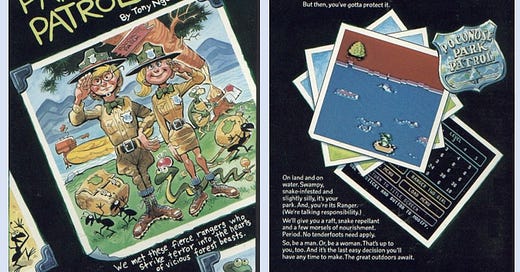The Classic PC Gaming Era (1977-1989) - Park Patrol
One of Activision's early PC exclusives is a fun and fast-moving game about collecting trash in a park.
RELEASE DATE: 1984
DEVELOPER / PUBLISHER: Activision
PLAYABILITY TODAY: Highly playable
BEST VERSIONS: Commodore 64

Developer Tony Ngo’s Park Patrol is an uncomplicated game built around a simple premise: you control a park ranger who zips up and down the shore of a lake, collecting trash, occasionally rescuing swimmers and frantically stopping ants from stealing your lunch. It plays so well and is so polished I was amazed to learn it is neither a port of a coin-op game nor a console title, despite looking and feeling very much like a game that would fit in on the Intellivision, Atari 5400 or 7200 libraries. But no; somehow, Park Patrol was a Commodore 64 exclusive in North America, and it’s also one of Activision’s best games from the era, right up there with River Raid, Pitfall and Dolphin.

The first thing modern gamers will notice about Park Patrol is that it moves surprisingly fast; the ranger has the ability to drive a boat around the lake or to walk around on land, and the boat in particular is surprisingly zippy and highly maneuverable, which is good since the lake is populated with lots of snakes and logs that can knock the ranger out of the boat (though snakes can be dealt with using repellant). Moving on land is a bit slower-going, but there’s also less land than water, and the ranger is able to utilize a jump where the direction can be tweaked mid-air to avoid hazards. Quite often, those hazards are spry turtles who patrol the land with a surprising speed. Fortunately, they can be lured into the water and collected so they won’t pose further problems.
As the game progresses, ants also begin appearing on the land and will steal the ranger’s lunch from the starting station. If the ranger can manage to get beside them, the ants can be kicked into the water and the ranger can eat the lunch for a quick burst of energy. There are also plants that will occasionally sprout berries which can double the ranger’s speed, which can be quite useful for addressing another persistent problem: errant swimmers who will not only knock the ranger out of the boat, but also get into trouble and require a rapid rescue.
While all of that may sound simple, the way it all comes together is beautiful, and there’s a ton of attention to little details that are far above and beyond what you’ll see out of most arcade-style PC games from the early 1980s. For example, unlike most games of its era, Park Patrol provides players with the choice of whether their ranger will be male or female. This has no noticeable impact on the game aside from changing the character sprite’s proportions and face a little bit, and yet it’s thoughtfully included to ensure gamers of either gender feel accommodated. The animations are smooth and make the character sprites feel like they’re part of the game world. The game even has a lovely soundtrack with five different tunes which starts off in an exciting three-channel arrangement before stepping down to a single channel and continuing quietly into the background.

While Park Patrol is probably not a game you’ll spend a lot of time playing once you figure out how to play it (an hour or two will show most gamers about as much as there is to see), it’s absolutely a worthwhile experience and certainly one of my favorite Commodore 64 exclusives. In the UK, it received some decent ports for the Amstrad CPC and ZX Spectrum, but the Commodore 64 version is the original and, in my estimation, the best.
As Our Series Continues…
In the coming weeks, we’ll talk about arcade action games, 3D games, flight simulators, sports games, gameroom games, puzzle games and so much more.
And while you’ll definitely see some titles from prominent North American publishers like Sierra On-Line, Infocom, Activision, Electronic Arts, Brøderbund, SSI, MicroProse, Lucasfilm Games, Epyx and Sir-Tech in the mix, you’ll also see references to games from the United Kingdom, Australia, France, Spain and Japan.
If you’ve missed the earlier entries in the series, which cover ASCII games, adventure games, wargames, strategy games and role-playing games, you can find the entire archive at https://greatestgames.substack.com.
Anything I don’t share here will be in my upcoming book, tentatively titled The Greatest Games You (Probably) Never Played Vol. 1. Subscribe to this newsletter so you won’t miss it!



